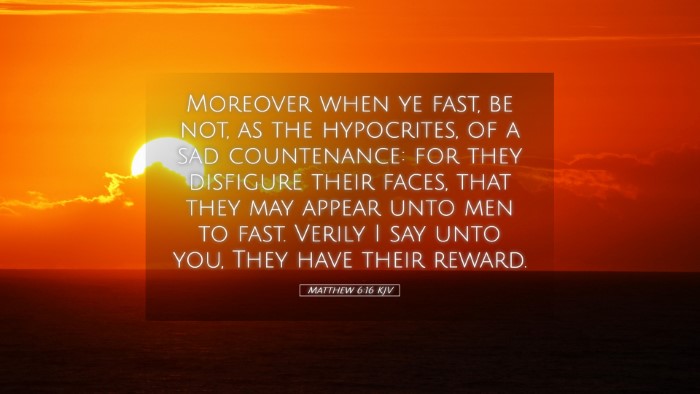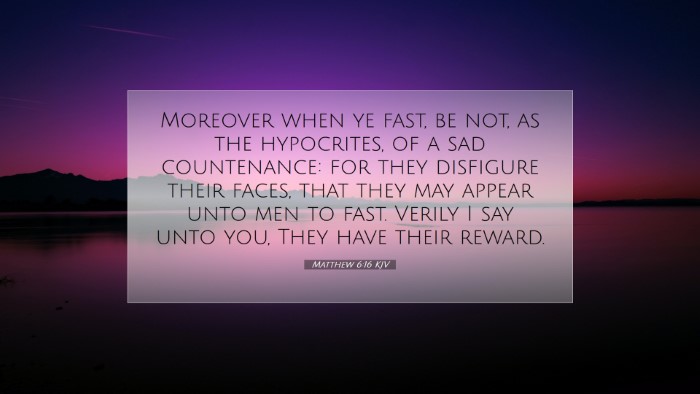Commentary on Matthew 6:16
Bible Verse: “Moreover, when ye fast, be not, as the hypocrites, of a sad countenance: for they disfigure their faces, that they may appear unto men to fast. Verily I say unto you, They have their reward.”
Introduction
This verse falls within the context of Jesus’ Sermon on the Mount, where He instructs His followers on authentic religious practices that please God rather than seeking human approval. Fasting, as observed by the religious elite in Jesus’ time, serves as a significant topic illustrating deeper spiritual truths.
Contextual Analysis
Jesus addresses the practice of fasting, which was established in the Mosaic Law and widely observed in Jewish culture. Albert Barnes emphasizes the idea that the correct approach to fasting is essential for spiritual integrity, noting that the motive behind fasting is of utmost importance. While fasting can be a means of expressing humility and dependence on God, it had devolved into a means of displaying piety in some circles.
Commentary Insights
Hypocrisy in Practice
Matthew Henry outlines how Jesus condemns the practice of hypocritical fasting, indicating that true fasting should stem from a contrite and sincere heart. The “hypocrites” mentioned refer to the Pharisees and other religious leaders who took great care to ensure that their piety was visible, often at the expense of genuine devotion.
Appearance vs. Reality
Adam Clarke emphasizes the disconnect between outward appearances and inner spirituality. He points out that the “sad countenance” adopted by these hypocrites is a deliberate act to draw attention to themselves. This behavior undermines the essence of fasting, which is meant to be a private expression of repentance and reliance on God. Clarke also notes that Jesus points out this deception to lead His followers to a more profound understanding of authentic spiritual discipline.
The Reward of Men
Jesus states that those who practice such outward fasting have received their reward already, a theme echoed by both Henry and Barnes. Their reward, in the eyes of society, is nothing more than human acknowledgment, lacking any real spiritual significance. Matthew Henry asserts that the true reward for fasting comes not from public admiration, but rather from God, who sees what is done in secret.
The True Purpose of Fasting
Barnes discusses the significant purpose of fasting in restoring one’s relationship with God. He highlights that fasting should be a time of spiritual renewal, aimed at seeking God’s favor and guidance. The commentary encourages believers to engage in fasting that fosters emotional and spiritual growth instead of public validation.
Practical Applications
- Personal Reflection: Fasting should be an act of personal devotion; evaluate the intentions behind your spiritual disciplines.
- Sincerity over Show: Avoid practices that seek external validation; instead, focus on cultivating a heart aligned with God’s will.
- Community Insight: Encourage discussions within the church regarding the right practices of fasting, emphasizing the importance of individual spiritual health over collective image.
- Teach Authenticity: Pastors and leaders should model and teach the authentic practice of fasting as a means to deepen one's relationship with Christ.
Conclusion
The admonition in Matthew 6:16 serves as a timeless reminder of the nature of true spirituality. The combined insights from Matthew Henry, Albert Barnes, and Adam Clarke collectively urge readers to critically assess their motives behind fasting and to embrace practices that align with genuine devotion rather than external approval. Authenticity in our relationship with God leads not only to deeper personal fulfillment but also to a more meaningful witness to the world.


